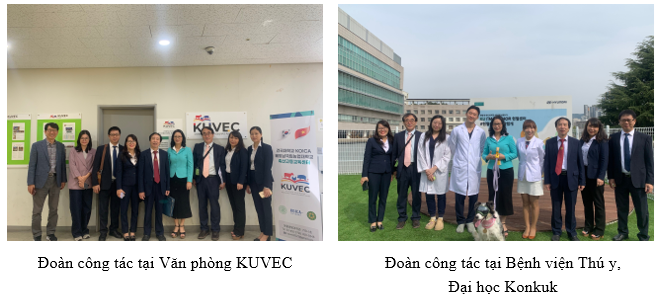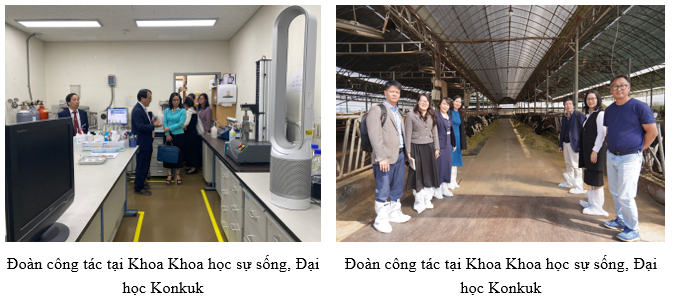Within the framework of the Project entitled "Improving training capacity for Vietnam National Universtiy of Agriculture (VNUA) to improve human resources in Vietnam's Livestock Industry" (KOICA - VNUA Project), from October 12 to October 18, 2023, VNUA’s delegation led by Prof. Dr. Nguyen Thi Lan, Party Secretary, VNUA’s President, and KOICA-VNUA project director, visited and worked at Konkuk University, Korea (partner of the KOICA-VNUA project). The purpose of the business trip was to train and improve the capacity of experts and livestock managers in Korea. This was one of the contents of the capacity building component for lecturers and officials in the livestock industry and staff from relevant agencies.
On the first working day (October 13, 2023), the delegation visited and worked with the KUVEC Project office, Project Office in Korea; Veterinary Hospital and Faculty of Life Sciences at Konkuk University. The KUVEC Project Office was a working room with the following operational functions: (i) hosting meetings between the two sides and events related to project activities; (ii) resolving issues related to interns and visiting relevant Korean certification agencies; (iii) managing the consultation about policy institutions for the animal feed certification analysis center, establishing an animal genetic resource system, a quality assessment system for livestock products, and environmentally friendly livestock systems; and (iv) maintaining and managing facilities and machinery equipment similar to the VKLI office (Vietnam – Korrea Livestock Insitute) at the Faculty of Animal Science, VNUA. At the meeting, the two sides exchanged information related to the project with representatives of the Korean Project Management Board, and agreed on operational procedure between Vietnam and Korea in order to achieve the project goals. On the same day, the delegation visited the Veterinary Hospital of Konkuk University, Korea. That was a large-scale, modern hospital with a number of centers such as the Animal Emergency Center; KU I'm DogNOR Blood Donation Center; KU Clinical Testing Center; Animal Disease Diagnosis Center (providing specialized diagnostic and treatment services for animals); and Center for Animal Cancer Treatment (the first animal cancer medical center in the country to be established in a university and currently preparing the foundation for drug development anti-cancer for animals). During the meeting, the delegation discussed with the Veterinary Hospital, Konkuk University about issues related to inviting experts from the Veterinary Hospital, Konkuk University to conduct training for the staff of the Veterinary Hospital at VNUA, Vietnam; providing scholarships to exchange VNUA’s staff and students to do research, practice, and conduct internships at the Veterinary Hospital, Konkuk University; and cooperating in joint research between the two parties. Also, on the same day, the delegation visited and worked with the Sang-Huh Faculty of Life Sciences, which trained high-quality human resources in livestock production, basic research on animal nutrition and feed, quality of livestock products, livestock environment, and improving animal welfare and environmentally friendly livestock products.
On the second working day, the delegation visited and worked with Songyeongshin Farm (a dairy farm) applying ICT technology. The delegation learned about automated livestock models (such as automatic food mixers, automatic milking machines and automatic manure treatment systems without odors) that did not use human power and combined ICT technology with the goal of sustainable agricultural development. The farm was also a livestock model that met organic livestock standards with the feed being entirely self-grown or imported natural grass; and this was also the first Korean farm to achieve animal welfare certification. On the same day, the delegation visited and worked with the Nonghyup Feed Anseong Agricultural Research Institute, which performed many core functions to produce safe livestock products (organic feed). The Animal Feed Research Institute had the main task of producing organic feed, analyzing animal feed, as well as carrying out various research to improve animal productivity as well as examining food safety and ensuring fertilizer and water quality. Domestic and imported raw material sources ensured completely naturally grown elements with no pesticides and no genetic modifications used to produce organic feed for organic livestock farms in Korea.
On the third working day, the delegation worked with the Pyeongchang Campus of Seoul National University located in Pyeongchang district, Gangwon province, Korea. With an area of 280 hectares, Pyeongchang facility had an advanced Green Bio research area with an investment of 300 billion won by the state, which contained: (i) An Equipment Center providing diverse equipment to analyze local products; (ii) An Animal Center doing research on animals such as pigs and rodents to initially test animal organ transplants; (iii) A Center for Research on Reducing Greenhouse Gas Emissions; (iv) A Crop complex (creating tree varieties adapted to climate change, planting using smart farm technology); (v) Hanwoo beef farm; (vi) Chicken farm; and (vii) An Institute of Clinical Training (training of Veterinary doctors). The Green Bio Center operated in the direction of "taking life as the core" and establishing a "new industrial strategy" to build new urban areas in the direction of Green Bio. Green Bio's activities included building a "local industry" network, promoting cooperation between local businesses and universities to create high quality products (high quality ginseng, high quality soy milk) and commercialize and support those products to enter into foreign markets. During the meeting, the two sides discussed about student and staff exchange to Pyeongchang Campus as well as conducting joint research. The two sides also agreed to sign a Memorandum of Understanding in the near future. Also on the same day, the delegation visited the famous sheep farm on Daewallyeong Road, Pyeongchang District, Gangwon Province, Korea. The Daewallyeong sheep farm was a model of livestock production combined with typical Korean paid tourism activities.
Some photos of the working visit

